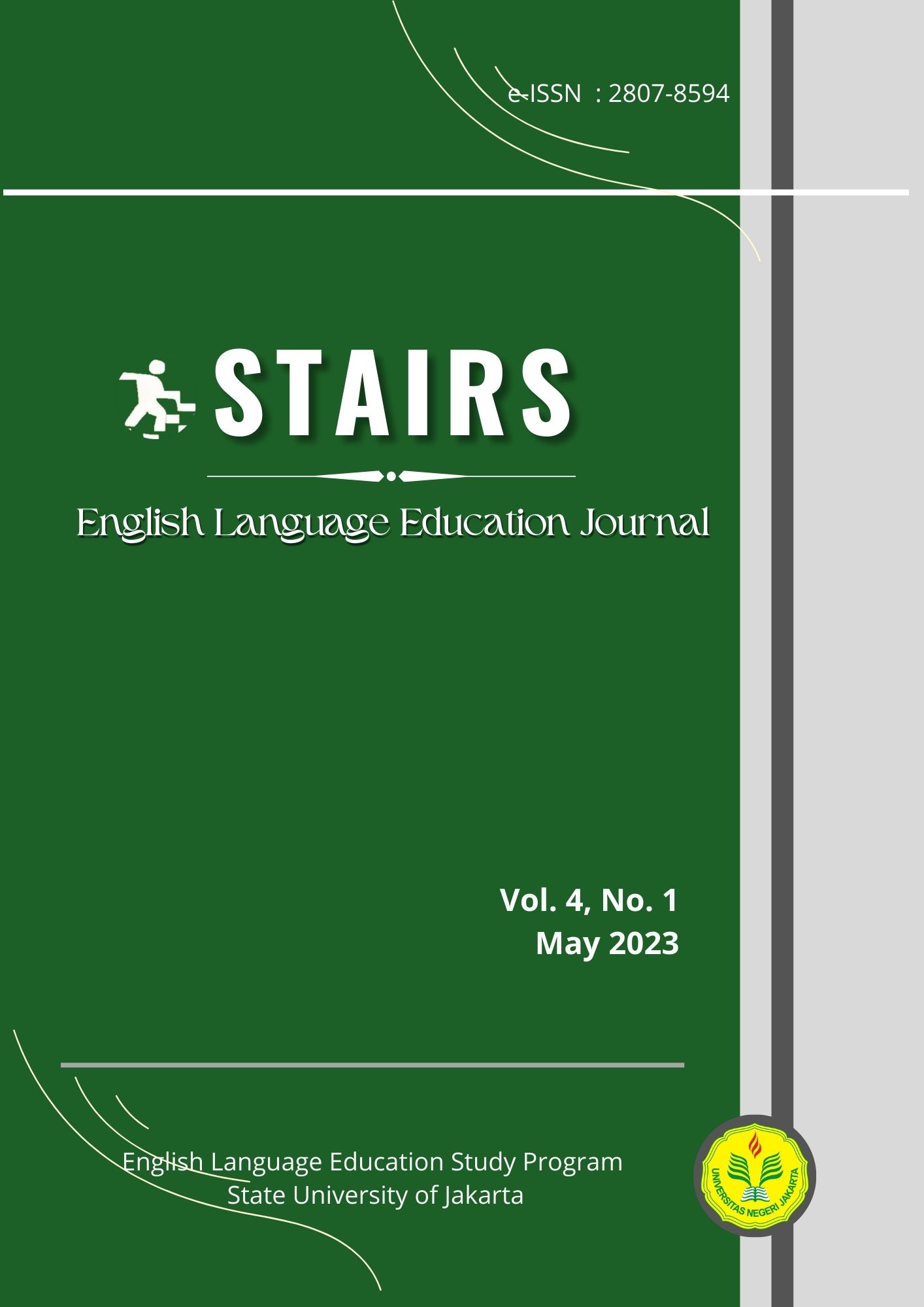The Incorporation of Digital Citizenship Competency in e-Learning Materials for Junior High School Students: A Content Analysis
DOI:
https://doi.org/10.21009/stairs.4.1.4Keywords:
Digital Citizenship Competency, Digital Leaning Material, Global CitizenshipAbstract
This study aims at investigating the way Digital Citizenship Competencies (DCC) are incorporated into digital learning materials (DLM) in a web-based learning platform called myenglishstep.com. By compiling 115 DLM of 7th up to 9th Grade and utilizing the content analysis method, the finding shows skills dimension is found to be the highest incorporation, followed by the knowledge dimension. In contrast, the attitudes and values dimension showed low occurrences compared to the previous dimension. Knowledge, skills, and attitudes dimensions of DCC are mostly incorporated in all DLM categories through tasks, contents, and visuals, while values dimensions are incorporated through contents for the most part and tasks. Therefore, these findings are expected to raise people's awareness of digital citizenship competencies and aid teachers and stakeholders in providing reliable and varied digital learning materials.
References
Angelina, S., Mayuni, I., & Agustina, I. W. (2022). Cultural Contents in Digital Authentic Greeting Cards as English Teaching Materials for Junior High Schools. STAIRS English Language Education Journal, 3(1), 19–28.
Ardani, H. N., & Agustina, I. W. (2022). The Alignment of Interpersonal Text Language Functions in Podcasts with the Standard Competence of English Language for Junior High School. STAIRS English Language Education Journal, 3(1), 53-65.
Cohen, L., Manion, L., & Morrison, K. (2018). Research Methods in Education (Eighth ed.) [E-book]. Routledge.
Council Of Europe, & Barrett, M. D. (2016). Competencies for Democratic Culture [E-book]. Council of Europe. https://rm.coe.int/16806ccc07
Creswell, J. W. (2014). Research Design: Qualitative, Quantitative, and Mixed Methods Approaches (Fourth ed.) [E-book]. SAGE Publications.
Fang, F. G. (2019). Global citizenship education and English as a lingua franca. English Language Teaching and Research Journal (ELTAR-J), 1(1), 1. https://doi.org/10.33474/eltar-j.v1i1.4772
İlhan, G. O., Kaba, G., & Sin, M. (2021). Usage of Digital Comics in Distance Learning During COVID-19. International Journal on Social and Education Sciences, 3(1), 161–179. https://doi.org/10.46328/ijonses.106
Inayah, N., & Sulistyaningrum, S. D. (2021). Employing Online Paraphrasing Tools to Overcome Students’ Difficulties in Paraphrasing. STAIRS: English Language Education Journal, 2(1).
Joyo, A. D., Putro, S. C., & Herwanto, H. W. (2020). Pengembangan Bahan Ajar Simulasi Digital Bermuatan Model Edutainment untuk Menumbuhkan Keaktifan Belajar Siswa Kelas X TKJ di SMK Negeri 2 Turen. Jurnal Teknologi, Kejuruan, Dan Pengajarannya, 43(1), 1–10. https://doi.org/10.17977/um031v43i12020p1-10
Kemendikbud Sampaikan Capaian Tahun 2020 dan Sasaran Tahun 2021. (2021, January 5). Kementerian Pendidikan, Kebudayaan, Riset, Dan Teknologi. https://www.kemdikbud.go.id/main/blog/2021/01/kemendikbud-sampaikan-capaian-tahun-2020-dan-sasaran-tahun-2021
Kemendikbud. (2018, December). Salinan Peraturan Menteri Pendidikan Dan Kebudayaan Republik Indonesia Nomor 35 Tahun 2018 Tentang Perubahan Atas Peraturan Menteri Pendidikan Dan Kebudayaan Nomor 58 Tahun 2014 Tentang Kurikulum 2013 Sekolah Menengah Pertama/Madrasah Tsanawiyah. Kementrian Pendidikan dan Kebudayaan. https://pusmenjar.kemdikbud.go.id/download/file-71
Lune, H., & Berg, B. (2016). Qualitative Research Methods for the Social Sciences, Books a la Carte (9th ed.). Pearson.
Luthfi, Z., Muchtar, H., Bestari, P., Waldi, A., & Prasetiyo, W. (2020). Civic Education: Fostering Global Citizenship among Indonesian Students. Proceedings of the 1st Conference of Visual Art, Design, and Social Humanities by Faculty of Art and Design, CONVASH 2019, 2 November 2019, Surakarta, Central Java, Indonesia. https://doi.org/10.4108/eai.2-11-2019.2294888
Maida, F. S., & Dewanti, R. (2021). The Incorporation of Citizenship Competency in EFL Learning Materials for Senior High School Students. STAIRS English Language Education Journal, 2(2), 17–32. http://journal.unj.ac.id/unj/index.php/stairs/article/view/23935/11561
Maulidiana, L. N., Cahyaningtyas, A. P., & Ismiyanti, Y. (2021). Development of Digital Interactive Module “E-MOSI” (Elektronik Modul Puisi) for Grade IV Students of Elementary School of Kemala Bhayangkari 02. EduBasic Journal: Jurnal Pendidikan Dasar, 3(2), 137–148. https://ejournal.upi.edu/index.php/edubasic/article/view/32617
Mayuni, I., Leiliyanti, E., Palupi, T. M., & Agustina, I. W. (2021). Pengembangan Materi Pembelajaran Bahasa Inggris berbasis Literasi Digital untuk Siswa Sekolah Menengah Pertama. Universitas Negeri Jakarta.
OECD. (2019). OECD Learning Compass 2030: A Series of Concept Notes [E-book]. OECD. https://www.oecd.org/education/2030-project/teaching-and-learning/learning/learning-compass-2030/
OECD. (2019). PISA (Program for International Student Assessment) 2018 Assessment and Analytical Framework, PISA, OECD Publishing, Paris, https://doi.org/10.1787/b25efab8-en.
Oudri, N., & R. (2022, February 17). 4 Isu Utama Bidang Pendidikan dalam Presidensi G20. ITJEN KEMENDIKBUDRISTEK. Retrieved February 27, 2022, from https://itjen.kemdikbud.go.id/webnew/2022/02/17/4-isu-utama-bidang-pendidikan-dalam-presidensi-g20/
Riady, Y. (2020). Does Digital Books-Based Android Device Application Matter for Effective Distance Learning? A Lesson from Universitas Terbuka Indonesia. International Journal of Web Applications, 12(1), 21–29. https://doi.org/10.6025/ijwa/2020/12/1/21-29
Richardson, J., & Milovidov, E. (2019). Digital citizenship education handbook: Being Online, well-being online, and rights online. Council of Europe.
Shopia, K., Sabila, D., & Purnawati. (2022). Students’ Interest in Learning English through YouTube (A Case Study in Senior High School of Sekolah Alam Cikeas Bogor). STAIRS: English Language Education Journal, 3(1).
The Organisation for Economic Co-operation and Development (OECD). (2018). The OECD PISA Global Competence Framework [E-book]. OECD. Retrieved August 2022, from https://www.oecd.org/education/Global-competency-for-an-inclusive-world.pdf
UNESCO. (2014). Global citizenship education: preparing learners for the challenges of the 21st century [E-book]. UNESCO. https://www.gcedclearinghouse.org/sites/default/files/resources/170053eng.pdf
UNESCO. (2015). Global citizenship education: topics and learning objectives. UNESCO. https://unesdoc.unesco.org/ark:/48223/pf0000232993_eng
UNESCO. (2020). Education for Sustainable Development: A roadmap. UNESCO. https://www.gcedclearinghouse.org/resources/education-sustainable-development-roadmap
UNESCO & Australian Council for Educational Research. (2016). Paper commissioned for the Global Education Monitoring Report 2016, Education for people and planet: Creating sustainable futures for all. https://unesdoc.unesco.org/ark:/48223/pf0000245577



